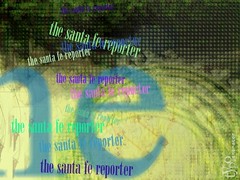The Public Editor
I think I mentioned recently my new obsession with Daniel Okrent's Public Editor column in The New York Times. This is a copy of a letter I sent him today:
Dear Mr. Okrent,
I have been enjoying your Public Editor column, particularly the discussion of late regarding a journalist’s relationship with anonymous sources. I am the editor of The Santa Fe Reporter, a weekly alternative newspaper in Santa Fe, NM. We used your column recently to discuss this relationship as part of an in-house training for our editorial department. Our two reporters were required to research your assertion that a journalist’s agreement with an anonymous source was, in effect, a contract: anonymity in exchange for accurate information. You maintain that should the information not hold up, the journalist is not required to maintain a source’s anonymity. Subsequently you have proposed that a journalist stipulate this agreement, at least verbally, to the anonymous source.
In our research, which wasn’t extensive but involved talking with a journalism ethics professional at Poynter and looking at articles on the subject, we didn’t find too much to support this premise. In our discussions, we agreed there should be few instances in which information gained off the record or anonymously shouldn’t be verifiable through public or on-the-record sources, and certainly your assertion that a sole anonymous source should be held to a higher standard (through the contract idea) has some appeal.
We also agreed that a reporter has the obligation to re-source any information that originates with an anonymous source (preferably, when possible, through public documents).
At the same time, we thought it would be difficult to ever obtain information if an anonymous source felt that their anonymity would be jeopardized under any circumstances. I also felt that your column failed to properly distinguish between the anonymous sources, off-the-record comments and deep background sources that often comprise a reporter’s field of inquiry.
Our discussion raised several other questions for me. For one, the notion of a contract, implied or otherwise, doesn’t seem to do justice to the often-subtle relationship between a journalist and a source (I’m thinking of Janet Malcolm’s The Journalist and the Murderer as well as my own experiences). It also creates, I think, additional problems for future reporting. For example, if a story uses an anonymous source, but later the information seems unreliable, does the anonymous source get the opportunity to prove why he or she believed it to be correct at the time? If so, would this be enough to continue their anonymity? Your premise also seems to elevate sources with journalists to some kind of partnership in getting information out and I think implies that the source of information is just as important as the information itself. Certainly this can be true, but doesn’t it require a judgement call? For example, if a political candidate gives me verifiable information on an opponent, but only on the condition that I don’t say where I got the information, do I then weigh the value of the information against how I got it? I suppose I do, except under your reasoning I feel I should be weighing simultaneously the newspaper’s values with the public’s. But what if the public cares more about who is slinging the mud than, for example, an old bankruptcy or an ugly divorce? Do I stop the flow of information to me from sources who don’t want to be revealed. Or do I get it and sit on it, keeping it from the public because I believe they have the right to know how I got it?
At any rate, I was hoping you might provide some due diligence reporting on this entire topic. I realize it may be taking your column into a more meta realm than intended, but anything that provokes journalists to consider what they’re doing from a different point of view will ultimately serve the reading public, eh?
Best,
Julia Goldberg
Editor
Santa Fe Reporter
Dear Mr. Okrent,
I have been enjoying your Public Editor column, particularly the discussion of late regarding a journalist’s relationship with anonymous sources. I am the editor of The Santa Fe Reporter, a weekly alternative newspaper in Santa Fe, NM. We used your column recently to discuss this relationship as part of an in-house training for our editorial department. Our two reporters were required to research your assertion that a journalist’s agreement with an anonymous source was, in effect, a contract: anonymity in exchange for accurate information. You maintain that should the information not hold up, the journalist is not required to maintain a source’s anonymity. Subsequently you have proposed that a journalist stipulate this agreement, at least verbally, to the anonymous source.
In our research, which wasn’t extensive but involved talking with a journalism ethics professional at Poynter and looking at articles on the subject, we didn’t find too much to support this premise. In our discussions, we agreed there should be few instances in which information gained off the record or anonymously shouldn’t be verifiable through public or on-the-record sources, and certainly your assertion that a sole anonymous source should be held to a higher standard (through the contract idea) has some appeal.
We also agreed that a reporter has the obligation to re-source any information that originates with an anonymous source (preferably, when possible, through public documents).
At the same time, we thought it would be difficult to ever obtain information if an anonymous source felt that their anonymity would be jeopardized under any circumstances. I also felt that your column failed to properly distinguish between the anonymous sources, off-the-record comments and deep background sources that often comprise a reporter’s field of inquiry.
Our discussion raised several other questions for me. For one, the notion of a contract, implied or otherwise, doesn’t seem to do justice to the often-subtle relationship between a journalist and a source (I’m thinking of Janet Malcolm’s The Journalist and the Murderer as well as my own experiences). It also creates, I think, additional problems for future reporting. For example, if a story uses an anonymous source, but later the information seems unreliable, does the anonymous source get the opportunity to prove why he or she believed it to be correct at the time? If so, would this be enough to continue their anonymity? Your premise also seems to elevate sources with journalists to some kind of partnership in getting information out and I think implies that the source of information is just as important as the information itself. Certainly this can be true, but doesn’t it require a judgement call? For example, if a political candidate gives me verifiable information on an opponent, but only on the condition that I don’t say where I got the information, do I then weigh the value of the information against how I got it? I suppose I do, except under your reasoning I feel I should be weighing simultaneously the newspaper’s values with the public’s. But what if the public cares more about who is slinging the mud than, for example, an old bankruptcy or an ugly divorce? Do I stop the flow of information to me from sources who don’t want to be revealed. Or do I get it and sit on it, keeping it from the public because I believe they have the right to know how I got it?
At any rate, I was hoping you might provide some due diligence reporting on this entire topic. I realize it may be taking your column into a more meta realm than intended, but anything that provokes journalists to consider what they’re doing from a different point of view will ultimately serve the reading public, eh?
Best,
Julia Goldberg
Editor
Santa Fe Reporter












<< Home